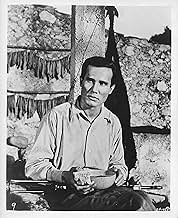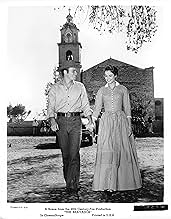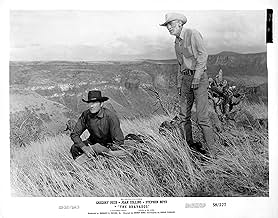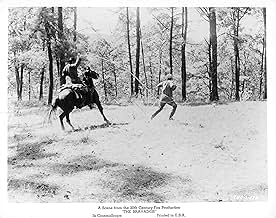NOTE IMDb
7,0/10
6,9 k
MA NOTE
Un homme poursuit quatre criminels qui ont tué sa femme et les retrouve dans la prison d'une petite ville, mais ils s'enfuient au Mexique.Un homme poursuit quatre criminels qui ont tué sa femme et les retrouve dans la prison d'une petite ville, mais ils s'enfuient au Mexique.Un homme poursuit quatre criminels qui ont tué sa femme et les retrouve dans la prison d'une petite ville, mais ils s'enfuient au Mexique.
- Réalisation
- Scénario
- Casting principal
- Récompenses
- 1 victoire et 1 nomination au total
Ninos Cantores de Morelia Choral Group
- Choir
- (as The Niños Cantores De Morelia Choral Group)
Robert Adler
- Tony Mirabel
- (non crédité)
Beulah Archuletta
- Mexican Waitress
- (non crédité)
Ada Carrasco
- Sra. Parral
- (non crédité)
Alicia del Lago
- Ángela Luján
- (non crédité)
Avis à la une
This is a smart western, it is not about the hero quick-drawing against four anonymous opponents at the same time, it is about moral.
For quite some time, you are not sure exactly where the movie is heading. The beginning is slow, with the goal to present the hero (Peck). He is doing just about the same silent, dry western hero as in "The Gunfighter". But the tempo goes up and the plot reveals, step by step. We get very convinced that the four criminals are quite bad men, and the worst is clearly the ruthless Bill (Stephen Boyd), ready for rape and murder any time it suits him.
Joan Collins, however, is mostly annoying, subject of an implied love story that the movie fortunately doesn't go deeper into. She has little importance to the story. It seems she is there only to tack on a touch of romance.
The movie manages to make each and every one of the bad guys (six of them if you count right) sharp and live, we get to know them. We also get to know a few others. The most famous villain actor here is clearly Lee van Cleef, who makes a great job as Parral, but the best character actor is really Joe DeRita (one of the Three Stooges) as Tucker/Simms, who is, incredibly, uncredited despite his fairly big role, central to the story. This means that both casting and script are very good, the script gives room for acting and the actors are capable of delivering.
From an action/western perspective, the movie fails on one thing: It could make more dramatic endings when people are killed, spend a little more time on their last seconds so we kind of follow them down. Now, a death is too much like flipping a switch. We don't have to use slow-motion every time, but a second or two extra would have helped in some places. In some cases, I feel that the movie really doesn't want to show too much violence and blood, but in at least two occasions it isn't that simple, it looks rather like if the director or producer was careless with some important scenes. These all to obvious mistakes lower the total a bit, but they don't ruin the movie, it just takes it below the absolute top.
But what the movie doesn't fail in is to deliver a message, a message of right and wrong, life and death, who has the right to kill. This is where it shines. After all is said and done, you find that there is still a lot more to say, more to think about, and the movie stays with me a lot longer than the average western where the difference between right and wrong is obvious and crystal clear.
For quite some time, you are not sure exactly where the movie is heading. The beginning is slow, with the goal to present the hero (Peck). He is doing just about the same silent, dry western hero as in "The Gunfighter". But the tempo goes up and the plot reveals, step by step. We get very convinced that the four criminals are quite bad men, and the worst is clearly the ruthless Bill (Stephen Boyd), ready for rape and murder any time it suits him.
Joan Collins, however, is mostly annoying, subject of an implied love story that the movie fortunately doesn't go deeper into. She has little importance to the story. It seems she is there only to tack on a touch of romance.
The movie manages to make each and every one of the bad guys (six of them if you count right) sharp and live, we get to know them. We also get to know a few others. The most famous villain actor here is clearly Lee van Cleef, who makes a great job as Parral, but the best character actor is really Joe DeRita (one of the Three Stooges) as Tucker/Simms, who is, incredibly, uncredited despite his fairly big role, central to the story. This means that both casting and script are very good, the script gives room for acting and the actors are capable of delivering.
From an action/western perspective, the movie fails on one thing: It could make more dramatic endings when people are killed, spend a little more time on their last seconds so we kind of follow them down. Now, a death is too much like flipping a switch. We don't have to use slow-motion every time, but a second or two extra would have helped in some places. In some cases, I feel that the movie really doesn't want to show too much violence and blood, but in at least two occasions it isn't that simple, it looks rather like if the director or producer was careless with some important scenes. These all to obvious mistakes lower the total a bit, but they don't ruin the movie, it just takes it below the absolute top.
But what the movie doesn't fail in is to deliver a message, a message of right and wrong, life and death, who has the right to kill. This is where it shines. After all is said and done, you find that there is still a lot more to say, more to think about, and the movie stays with me a lot longer than the average western where the difference between right and wrong is obvious and crystal clear.
This is an interesting Western which, as is often the case in this genre, is a tale of revenge. This time, however, there are a few ironical twists. Under the solid hand of director Henry King, this film takes further the point made in OXBOW INCIDENT in 1943, about lynching.
In this case, you have the main character, Jim Douglas (Peck) seeking revenge for the rape and brutal murder of his wife. Peck, in one of his finest performances, portrays a generally balanced and good man driven somewhat over the edge by a desire for revenge. The four "baddies" are all played with considerable zest by Stephen Boyd, Henry Silva, Lee van Cleef and Salmi. The weakest part of the film is Joan Collins. Tough for me to understand why and how she got this role.
Silva, portraying an Indian, correctly identifies Douglas as a hunter. It is Douglas' sad failing that he gets the wrong culprits, and even more so that he thought the real rapist and murderer a good man, who would not hurt anyone.
Douglas ends the film with a tormented conscience for killing three men who were innocent of his charges, but he receives great applause from the local community, grateful to see the town rid of a gang of thieves. The irony of the situation is put across without any moralizing, which adds to the film's virtues.
There are a few unnecessary touches along the way, such as Boyd raping an abductee, but by and large it is a tightly told story, helped by very good cinematography.
In this case, you have the main character, Jim Douglas (Peck) seeking revenge for the rape and brutal murder of his wife. Peck, in one of his finest performances, portrays a generally balanced and good man driven somewhat over the edge by a desire for revenge. The four "baddies" are all played with considerable zest by Stephen Boyd, Henry Silva, Lee van Cleef and Salmi. The weakest part of the film is Joan Collins. Tough for me to understand why and how she got this role.
Silva, portraying an Indian, correctly identifies Douglas as a hunter. It is Douglas' sad failing that he gets the wrong culprits, and even more so that he thought the real rapist and murderer a good man, who would not hurt anyone.
Douglas ends the film with a tormented conscience for killing three men who were innocent of his charges, but he receives great applause from the local community, grateful to see the town rid of a gang of thieves. The irony of the situation is put across without any moralizing, which adds to the film's virtues.
There are a few unnecessary touches along the way, such as Boyd raping an abductee, but by and large it is a tightly told story, helped by very good cinematography.
This late Henry King movie is one of his most under-rated films. It's a revenge western, powerfully scripted by Philip Yordan and directed with commendable restraint by King. Gregory Peck, (at his most stoic), is the rancher bent on bringing to justice the four men he believes raped and killed his wife. The men are a leering Stephen Boyd, Albert Salmi, Henry Silva and an over-excitable Lee Van Cleef. Joan Collins, by this time entrenched in her first American sojourn, is in there, too, but she's the weakest thing in the film. There is a crisis of conscience and a spiritual reawakening to be reckoned with and the film does pose some interesting questions of morality but there's tension and the pleasures that come from a good western, as well. One for rediscovery.
Gregory Peck is the show in "The Bravados". His performance reminds me of John Wayne in "The Searchers". In both cases the eyes tell the story. Wayne's were full of hate for the Comanches that defiled his niece. Peck's intense eyes are equally important to this film. In the words of one character, Peck has the "eyes of the hunter".
Like Wayne in "The Searchers" Peck is a man with a quest. Jim Douglas is out for revenge against the murderers of his wife. This single-minded mission brings him to the town of Santa Rita, where the four men he has been chasing are scheduled to hang for another killing. The men escape with a hostage and the chase resumes. Nothing will stop Douglas this time. In his mind the four men deserve no pity and they get none. The law failed to hang them, and now it's his turn.
The casting in this film is interesting. The four low lifes pursued by Peck include three pretty good actors, Stephen Boyd, Henry Silva and Lee Van Cleef. Of the three, Henry Silva's character is the most interesting. He plays Lujan, an Indian. Lujan and Peck share something. They lock eyes at the beginning when Peck visits the four men in jail. It is he who sees the eyes of the hunter. He may not know why Peck hunts them, but he recognizes him as a hunter.
Ultimately, Peck becomes a hero to the citizens of Santa Rita, but heroism comes with a price. In this case Peck sacrifices his humanity. In their end there is potential salvation for Peck from a surprising source.
Except for Lujan, the film provides little reason to sympathize with the four badmen. They have been sentenced to be hanged for a murder in Santa Rita. Steven Boyd ruthlessly shoots an old prospector. Later, he rapes their hostage. Even Joan Collins' character who earlier in the film has urged Peck to give up his relentless quest now urges him to track the surviving killers down and kill them.
There is no question about the morality in this film. There is something incomplete in Peck's character. He is empty inside, because the chase seems to be over. The law has apparently done his job for him. He has little to say to anyone when he arrives in Santa Rita, including his old friend Josefa (Collins). His eyes are full of hate, but otherwise he is hardly alive. He tells Josefa that he loved his wife. "I still do," he says. He has left his little girl behind to chase the killers. Near the end when he sees the little girl she hides behind her nanny. She hardly knows her father. The jail break and the ensuing chase seem to temporarily energize him. He becomes the leader of the possee. Ultimately, he rides off alone to extract his revenge. The energy is misleading. Peck knows what he must do and he does it without emotion. He has sacrificed his humanity at the altar of revenge.
This film is not for everyone. It is a bit intense, and Peck's character isn't very warm and fuzzy. "The Bravados" is a humorless film about a serious subject. Revenge isn't pretty and the price is too high. Peck really delivers with a great performance and the plot is definitely creative. The often told story of the man seeking revenge has seldom been told so well.
Like Wayne in "The Searchers" Peck is a man with a quest. Jim Douglas is out for revenge against the murderers of his wife. This single-minded mission brings him to the town of Santa Rita, where the four men he has been chasing are scheduled to hang for another killing. The men escape with a hostage and the chase resumes. Nothing will stop Douglas this time. In his mind the four men deserve no pity and they get none. The law failed to hang them, and now it's his turn.
The casting in this film is interesting. The four low lifes pursued by Peck include three pretty good actors, Stephen Boyd, Henry Silva and Lee Van Cleef. Of the three, Henry Silva's character is the most interesting. He plays Lujan, an Indian. Lujan and Peck share something. They lock eyes at the beginning when Peck visits the four men in jail. It is he who sees the eyes of the hunter. He may not know why Peck hunts them, but he recognizes him as a hunter.
Ultimately, Peck becomes a hero to the citizens of Santa Rita, but heroism comes with a price. In this case Peck sacrifices his humanity. In their end there is potential salvation for Peck from a surprising source.
Except for Lujan, the film provides little reason to sympathize with the four badmen. They have been sentenced to be hanged for a murder in Santa Rita. Steven Boyd ruthlessly shoots an old prospector. Later, he rapes their hostage. Even Joan Collins' character who earlier in the film has urged Peck to give up his relentless quest now urges him to track the surviving killers down and kill them.
There is no question about the morality in this film. There is something incomplete in Peck's character. He is empty inside, because the chase seems to be over. The law has apparently done his job for him. He has little to say to anyone when he arrives in Santa Rita, including his old friend Josefa (Collins). His eyes are full of hate, but otherwise he is hardly alive. He tells Josefa that he loved his wife. "I still do," he says. He has left his little girl behind to chase the killers. Near the end when he sees the little girl she hides behind her nanny. She hardly knows her father. The jail break and the ensuing chase seem to temporarily energize him. He becomes the leader of the possee. Ultimately, he rides off alone to extract his revenge. The energy is misleading. Peck knows what he must do and he does it without emotion. He has sacrificed his humanity at the altar of revenge.
This film is not for everyone. It is a bit intense, and Peck's character isn't very warm and fuzzy. "The Bravados" is a humorless film about a serious subject. Revenge isn't pretty and the price is too high. Peck really delivers with a great performance and the plot is definitely creative. The often told story of the man seeking revenge has seldom been told so well.
"Los Bravados" proves that Henry King totally mastered the western style among many others.Much more interesting than his precedent effort "the sun also rises",this work casts Peck as a desperate man eager to take revenge of four outlaws who killed and raped his wife. he arrives in the town where the criminals -or rather the men he thinks are the criminals- are to be hanged.
The first thirty minutes are the more convincing.The soundtrack is particularly remarkable:first we hear the hammers of the men building the scaffold;often there's no music at all and this ominous noise creates an agonizing atmosphere.Then ,later,the whole congregation attends the service in a baroque church and the canticles provides the movie with an even more sinister soundtrack.The editing shows in parallel the outlaws' escape and the people praying in the church where Peck gazes upon a madonna and her child:this picture will frequently come back in the movie as a leitmotiv:it's the image of forgiveness.
Because what makes this western worthwhile is the absurdity of the vengeance it depicts.Once a victim,the hero becomes a criminal.But as the priest says ,a lot of people kill and they do not feel any remorse. King's obsession seems to be the reconstruction of the family as well:Peck and his little girl with Collins ,and the half-breed who succeeded in convincing him that he's not responsible for his misfortune.And anyway ,for this director whose body of work stretches on 50 years ,forgiveness and love are many-splendored things.
The first thirty minutes are the more convincing.The soundtrack is particularly remarkable:first we hear the hammers of the men building the scaffold;often there's no music at all and this ominous noise creates an agonizing atmosphere.Then ,later,the whole congregation attends the service in a baroque church and the canticles provides the movie with an even more sinister soundtrack.The editing shows in parallel the outlaws' escape and the people praying in the church where Peck gazes upon a madonna and her child:this picture will frequently come back in the movie as a leitmotiv:it's the image of forgiveness.
Because what makes this western worthwhile is the absurdity of the vengeance it depicts.Once a victim,the hero becomes a criminal.But as the priest says ,a lot of people kill and they do not feel any remorse. King's obsession seems to be the reconstruction of the family as well:Peck and his little girl with Collins ,and the half-breed who succeeded in convincing him that he's not responsible for his misfortune.And anyway ,for this director whose body of work stretches on 50 years ,forgiveness and love are many-splendored things.
Le saviez-vous
- AnecdotesWhile filming, Gregory Peck decided to become a cowboy in real life, and he purchased a vast working ranch near Santa Barbara, California, already stocked with six hundred head of prize cattle.
- GaffesWhen the wounded sheriff staggers into the church (c.35') the bloodstain on his shirt does not match the knife wound inflicted earlier. It is significantly lower.
- Citations
Jim Douglass: You're wasting a lot of good lumber. A tree does just as well.
Sheriff Sanchez: They were sentenced to be hanged - not lynched!
- ConnexionsEdited into Voskovec & Werich - paralelní osudy (2012)
Meilleurs choix
Connectez-vous pour évaluer et suivre la liste de favoris afin de recevoir des recommandations personnalisées
- How long is The Bravados?Alimenté par Alexa
Détails
- Durée1 heure 38 minutes
- Rapport de forme
- 2.35 : 1
Contribuer à cette page
Suggérer une modification ou ajouter du contenu manquant

Lacune principale
What was the official certification given to Les Bravados (1958) in France?
Répondre


































